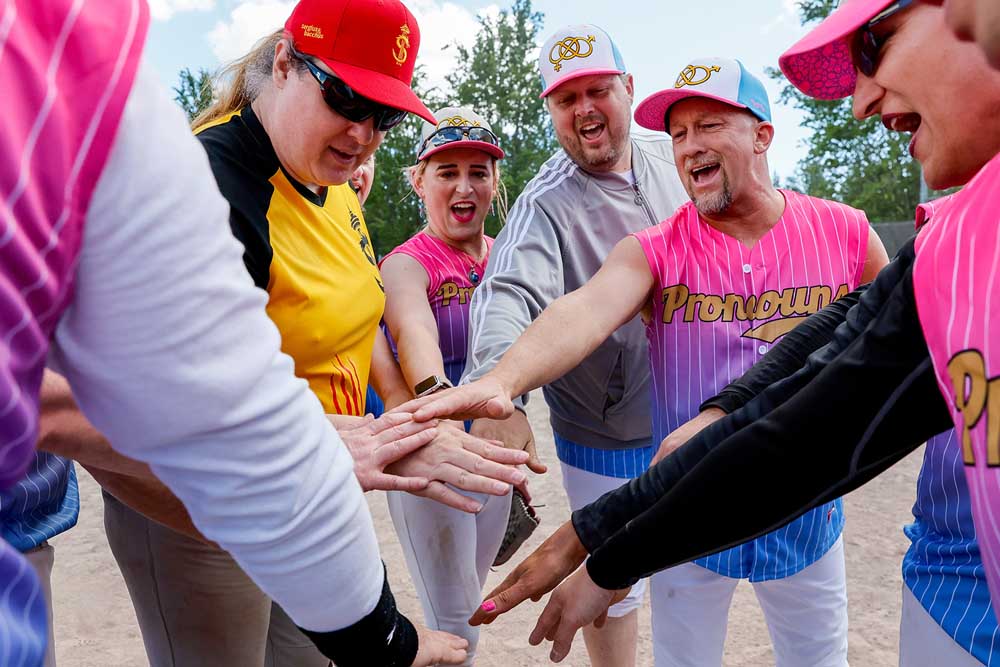Seattle’s Puget Sound Pronouns carve out place for transgender athletes, give back
Published 4:30 pm Saturday, June 8, 2024

- From left, head coach Sara Michelle Fetters, Brittney Miller, Jake Wagner, Justin Branam and Amanda Cox put their hands in for a cheer after a win Sunday, May 19, 2024, in SeaTac. (Jennifer Buchanan/The Seattle Times/TNS)
SEATTLE — A trip to the Gay Softball World Series is one of many dreams, but final scores aren’t all that concern the Puget Sound Pronouns, who are in their third season and thinking bigger via activism.
They compete in the Emerald City Softball Association, Seattle’s league for the LGBTQ+ community and allies, which is celebrating its 45th anniversary this season.
Brittney Miller, who plays first base, founded a team “that was explicitly friendly to trans and nonbinary players,” according to its website. Three years later, as a registered 501(c)(3) organization, it’s turned into a way to give back.
“It’s about sharing this LGBTQ+ family with the broader community,” coach Sara Michelle Fetters said. “It’s showing that trans people in sports, we’re not defined by how we look, how we act how or we present. That we can do anything.
“There is a place for you in the community to be a part of something bigger than yourself.”
Visibility is important, but not the extent. While traveling for tournaments, the Pronouns donate to local charities such as Philadelphia’s Attic Youth Center, which provides opportunities for LGBTQ+ youth, and the San Diego LGBT Community Center. Last summer they served as escorts at Queer Prom Seattle, a community event that offers another chance to people who couldn’t attend high school prom as their authentic selves. The team plans to help out again.
On Aug. 25 at Seattle’s Lower Woodland Park Playfields, the Pronouns are set to host their third annual youth skills clinic, which serves as an opportunity for queer kids to learn the sport and mingle with kindred spirits. All entry fees — which have been lowered from $30 to attract more participants and maximize the donation — will go to Seattle-founded Gender Justice League, an advocacy organization.
Stephen Porter, of Olympia, and his wife saw a way to get their son Eisley, 12, away from the computer. He’s never been a great fan of the outdoors, but loved the “accepting environment” of the Pronouns’ first clinic and wants to go back.
“He’s been through quite a bit of trauma in the last five years,” Porter said. “It’s not always easy to see a smile on his face.
“He didn’t know he could have such fun.”
That event hit home for right fielder Michael Vierela, a Pronoun since the beginning. His childhood was built around sports, but anti-gay language was common and the fear of being outed grew. Vierela quit around the age of 16 and said he lost a big part of his identity.
“I just didn’t really feel like welcome or safe in those kinds of spaces,” Vierela said. “It was a really confusing time in my life and I was terrified of the locker room in particular.”
Helping today’s queer kids have a better experience was meaningful. Rediscovering organized sports himself was maybe even euphoric.
“I remember the first practice I went to when I was playing with basically all queer people for the first time. It was kind of a surreal experience, really,” Vierela said. “For the longest time, I felt like I was the only one.”
He hit a late triple during a Pronoun showdown May 12 at North SeaTac Park & Ball Fields against the Badgers, the teams evenly matched and full of friends. Members of other squads, including the Washington Ferries, the Plastix and the Sinners milled around as the Pronouns came from behind to win their first game of the season.
Fetters, their coach, yelled instruction and encouragement. Fetters, who has written a few freelance stories for the Seattle Times, joined after a self-imposed hiatus, drawn back into the fold by the Pronouns vision and a desire to reach out to “that last person that was picked at recess.”
She has been a part of the league off and on since 2001. She said she was the first openly trans person to be in the ECSA, and back then, it was a wildly different experience.
“The (top-level) A team only ever took me to two tournaments, because they felt like they had to hide me whenever I went with them anywhere,” Fetters said. “I was told I couldn’t paint my nails, I had to hide my hair under a cap, all of these different things, because they were afraid of how other teams were going to react.
“That was really difficult for a long period of time. But at the same time, it’s where I found a community and a family that has embraced me and welcomed me and really given me a place to feel like I belong.”
The ECSA relationships, she said, probably saved her life.
Fetters walked, Miller said, so she and others could run the bases. Miller, a one-time sports assistant at The Seattle Times, and pitcher Brienne Wilka transitioned during the pandemic.
As the story so often goes, Wilka had to learn to pitch with her left hand after hurting her right on a naked slip-and-slide in Brush Prairie. She couldn’t be on the mound on Mother’s Day against the Badgers, having just undergone top surgery, but showed up anyway and kept the scoresheet to the delight of her coach.
As Fetters said, all are welcome. Kevin Wang, the Pronouns’ new leadoff hitter, identifies as straight, but said he hasn’t felt like an outsider. He hopes to learn more about nonprofit work from Miller.
The ECSA is so focused on making sure no one is playing at a lower level than they should be, it instituted a rule where each “C” team can only hit one out-of-the-park home run per game. Wang said he wasn’t aware of this, and his moment of glory that Sunday — the team’s dreaded second dinger — turned into an automatic out that ended an inning.
He got lightly razzed for that on his way to the parking lot.
“Maybe the team should educate me on the rules!” he joked.
In this instance, absolutely. But big-picture, Wang remains mindful of the fact that his teammates are “not just a story,” they’re humans living their lives, and it’s not their job to educate him.
“I should take it upon myself to better myself and to learn, not just make other people adapt to me,” Wang said. “I should learn and grow by putting in my own effort and energy. That’s a bit of what attracted me to the team.”
Among other, growing goals, the Pronouns seek to create a more inclusive space for their own participants and others. And if a prospective player’s skills are too advanced or raw for their own squad, they’ll find another fit on another team.
“There are so many out and proud and exciting trans players in our league now. And that is just so glorious to see,” Fetters said.
“I am just so gratified that I’ve been able to be with this league long enough to see this happen.”
____
What to know more about the skills clinic or other opportunities? https://pugetsoundpronouns.org/






